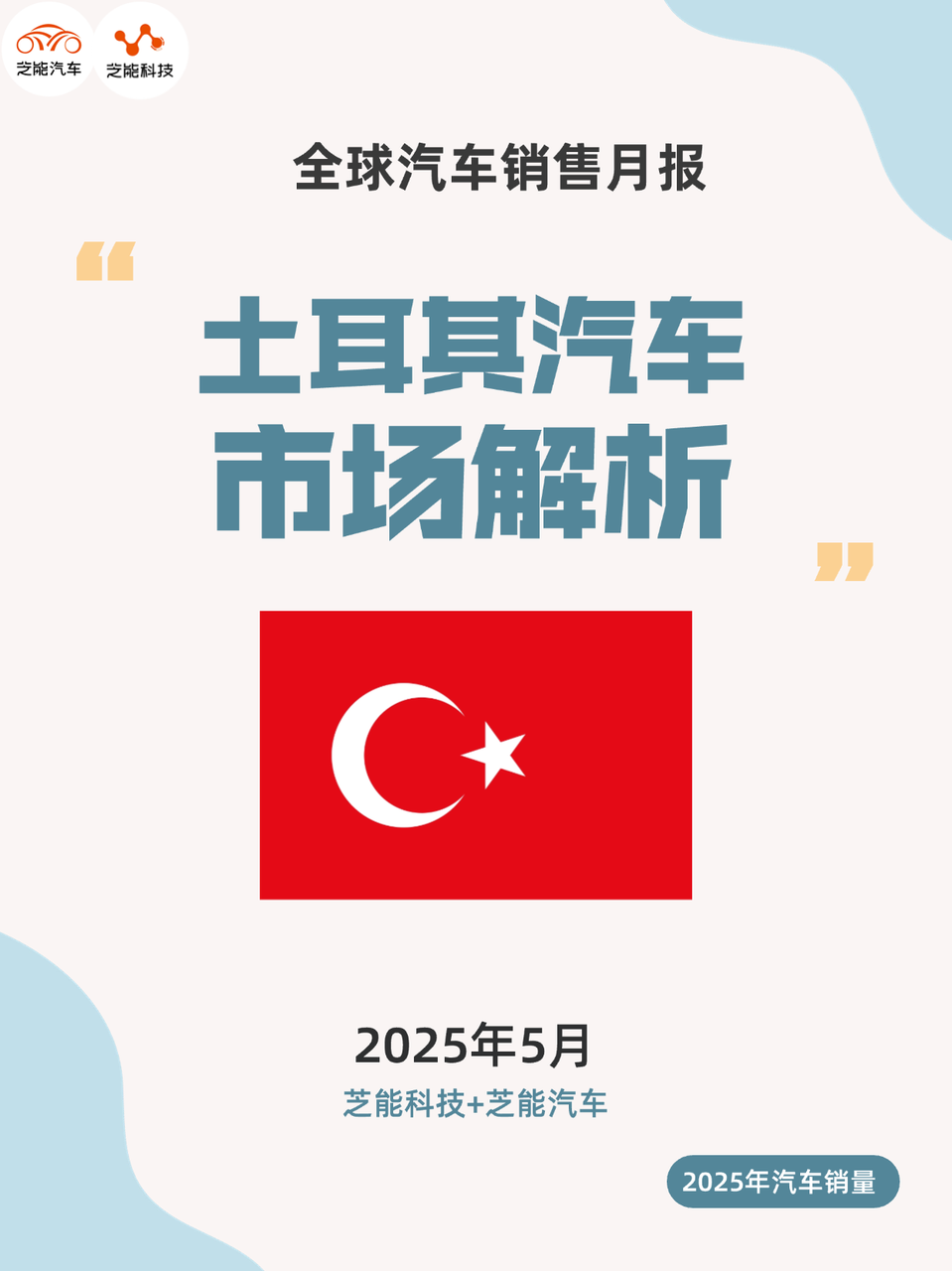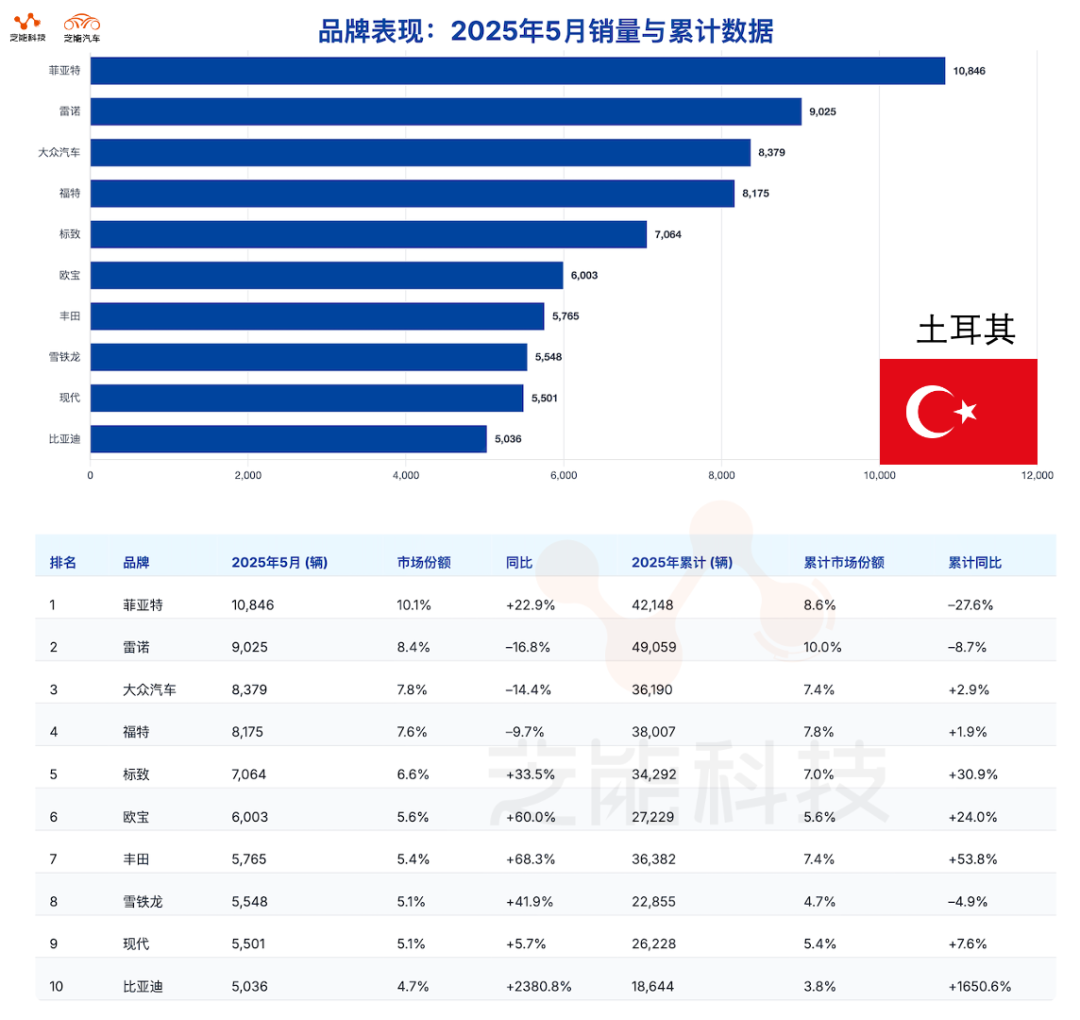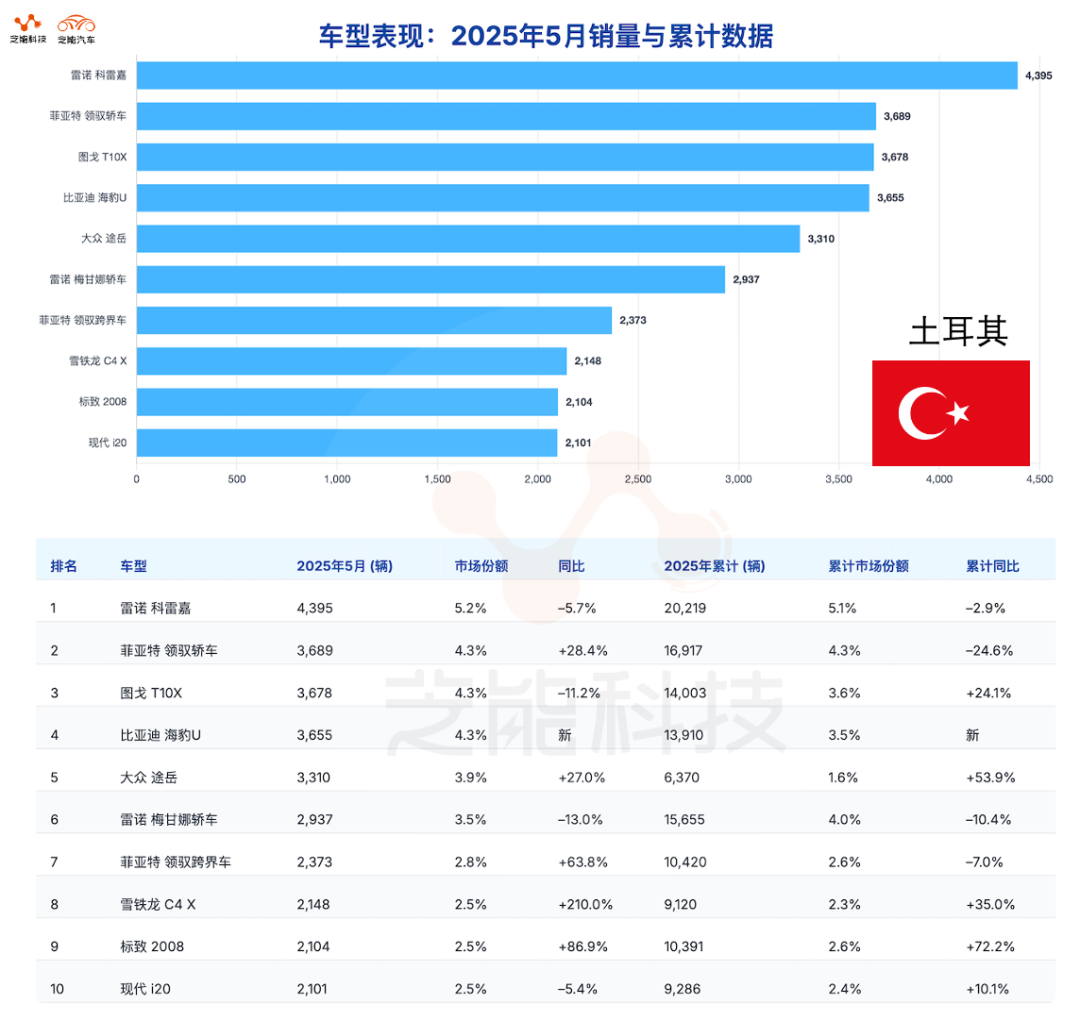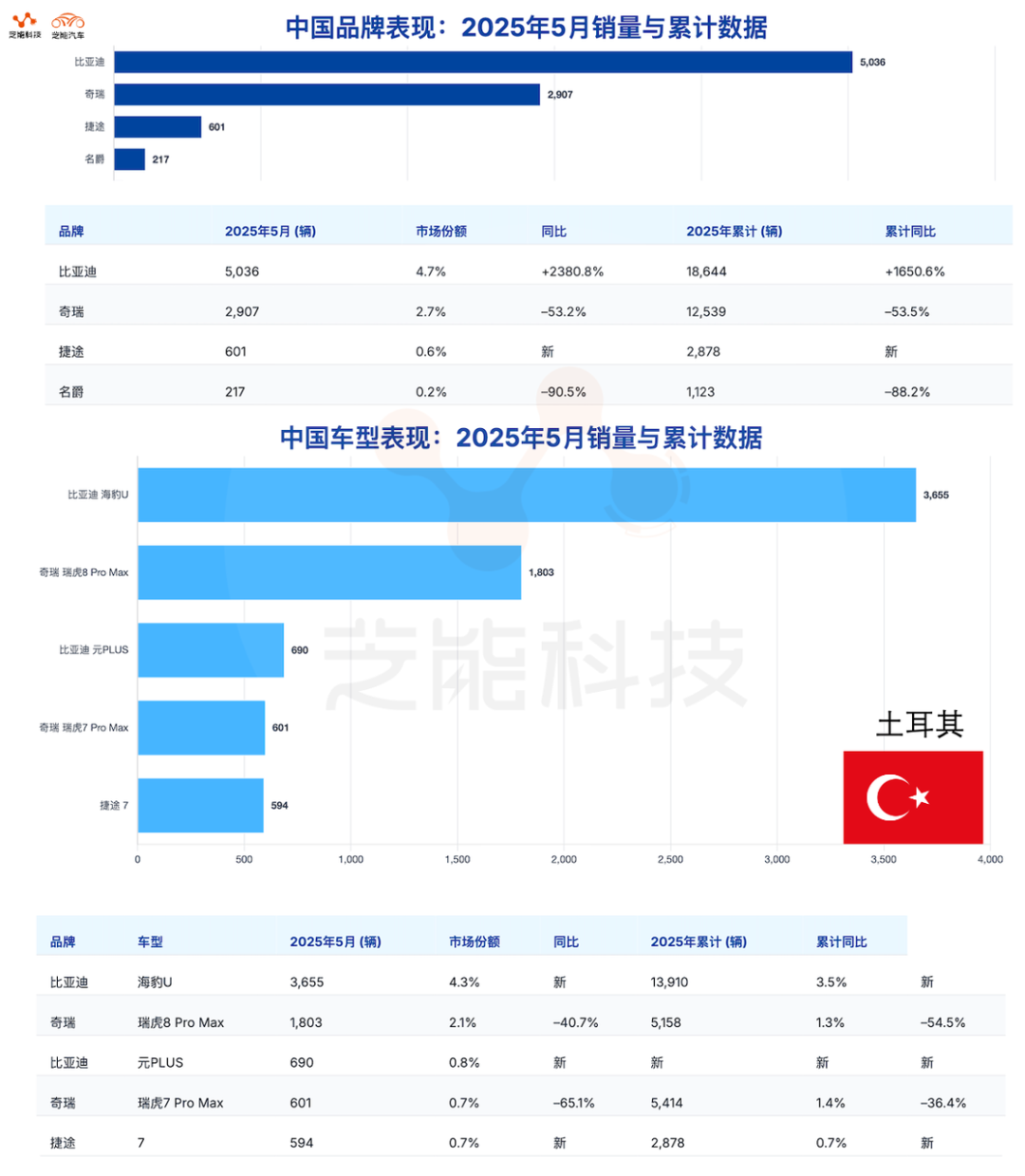Asian Auto Market | Turkey May 2025: BYD Breaks into Top 10, Chery Leads Sales Race
![]() 06/16 2025
06/16 2025
![]() 650
650

In May 2025, Turkey's new car market hit another milestone, with sales soaring 7.4% year-on-year. Among the standouts, Chinese brands emerged as the most dynamic growth engines.
BYD skyrocketed to the tenth spot, posting a remarkable 2380.8% year-on-year growth and selling 5,036 units in the month. Notably, the Seal U model ranked among the top four best-sellers. Conversely, traditional heavyweights like Renault, Volkswagen, and Ford generally experienced declines, accelerating the market's reshaping.
Demand for pure electric and hybrid vehicles surged significantly, with Chinese brands leveraging their intelligence and electrification advantages to swiftly challenge the dominance of mainstream European brands.
01
Overall Market Performance:
Traditional Brands Lose Momentum, New Forces Rise Rapidly
In May 2025, Turkey's new light vehicle market sold 107,730 units, marking a 7.4% year-on-year increase, second only to the all-time high in May 2023.
Cumulative sales for the first five months of 2025 reached 489,366 units, up 3.7% from the same period last year, setting a new record for the period.

Market Share Analysis:
◎ Fiat emerged as the month's biggest winner, reclaiming the top spot with 10,846 units sold, a 22.9% year-on-year increase, and a 10.1% market share, surpassing its 8.6% share in Italy.
This feat is attributed to the strong performance of its locally produced Egea series, with combined sales of the Egea sedan and Egea Cross exceeding 6,000 units, accounting for 7.1% of the new car market and making it the most popular model combination.
◎ Renault followed closely with 9,025 units and an 8.4% market share, though it still ranked second, down 16.8% year-on-year.
◎ Volkswagen and Ford also saw declines of 14.4% and 9.7%, respectively, performing below the market average.
◎ Peugeot, Opel, and Citroën showed more positive growth, with increases of 33.5%, 60%, and 41.9%, respectively, indicating a resurgence of French brands among consumers.
◎ Toyota's strong performance saw sales rise by 68.3% in May, ranking seventh and surpassing Ford and Volkswagen, gradually solidifying market acceptance for its hybrid products.

◎ Tesla ranked twentieth with sales of 1,545 units. From the beginning of the year to date, Tesla has sold 5,085 units in Turkey, a year-on-year increase of 1134.2%.
Model Rankings:
◎ Renault Clio remained at the top with sales of 4,395 units, though down 5.7% year-on-year.
◎ The Fiat Egea sedan ranked second, with a year-on-year increase of 28.4%.
◎ The T10X, the first model from the local electric vehicle brand Togg, sold 3,678 units, ranking third. Although down year-on-year, it showed slight improvement month-on-month.
◎ A dark horse was BYD's Seal U model, which sold 3,655 units in May, ranking fourth after Togg. This underscores the rising prominence of Chinese new energy products in the market of a traditional automotive powerhouse.
◎ Volkswagen's Taigo also made a significant leap, with a year-on-year increase of 27%, rising to fifth place.
Overall, the types of powertrains showed a structural shift: the growth of pure electric and hybrid vehicles outpaced that of fuel vehicles. Notably, the sales surge of electric vehicle brands such as BYD, Tesla, and Togg is transforming Turkey's traditional preference for fuel vehicles.
02
Performance Analysis of Chinese Brands:
BYD Leads Explosive Growth, Tesla Follows Closely
In May 2025, Chinese auto brands shined brightly in the Turkish market, with BYD making rapid inroads at an unprecedented pace.
◎ BYD soared to the tenth position in the market with sales of 5,036 units, a year-on-year surge of 2380.8%, becoming the only Chinese brand to enter the top 10, with a market share of 4.7%.
Since the beginning of the year, its cumulative sales in Turkey have reached 18,644 units, accounting for 3.8% of the total market share, with its ranking soaring from 26th last year to the top 10.
The stellar performance of the Seal U model was the key driver, with sales reaching 3,655 units in May, ranking fourth in the overall market, surpassing multiple established best-sellers, and marking a significant breakthrough for Chinese cars in overseas markets.

◎ Besides BYD and Tesla, Chery ranked fourteenth with sales of 2,907 units, but saw a year-on-year decline of over 50%. Despite entering the Turkish market early and establishing channels, Chery failed to transition timely to a new energy-focused brand, currently facing growth pressures.
◎ Other Chinese brands such as ZERO RUN and Hongqi are still in the exploration stage, with limited sales but gradually building brand recognition.
The Turkish market for Chinese brands shows a polarized pattern, with "the strong getting stronger".
◎ BYD has achieved a comprehensive breakthrough with its complete product matrix and new energy advantages. Models like Seal U and Dolphin resonate with Turkish consumers in terms of design, intelligence, and range.
Chinese brands are already exerting substantial pressure on traditional mainstream brands. For instance, in May, BYD's sales as a single brand approached those of Hyundai and Citroën, surpassing Škoda, and emerging as a formidable competitor alongside Opel and Toyota.
◎ Though the local electric vehicle brand Togg remained in the top 10, it saw a year-on-year decline of 11.2%. Its core competitiveness still hinges on "national project" support, while BYD, Tesla, and others achieve growth through market mechanisms.
In the future, Chinese brands may gradually surpass Togg in terms of brand influence, technical strength, and user reputation.
Summary
As Turkey's market transitions from fuel vehicles to electric vehicles, Chinese brands have demonstrated robust market adaptability and brand momentum, particularly with BYD rapidly advancing and challenging the status quo of traditional automakers.







